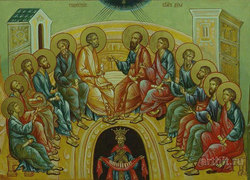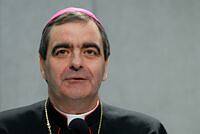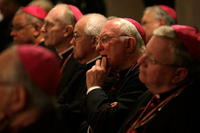Are you praying for the Holy Spirit’s
 intercession? Will you following the Pope’s meeting on the Bible? Prayer to the Spirit is always key to the work of our Church: the scholars, pastors, students and faithful rely on our intercession on their behalf.
intercession? Will you following the Pope’s meeting on the Bible? Prayer to the Spirit is always key to the work of our Church: the scholars, pastors, students and faithful rely on our intercession on their behalf.
A meeting was called by Pope Benedict XVI to study the role of the Bible in our lives as Catholics. The meeting (October 5-26) is technically called by the Church a “Synod of Bishops” which is a gathering of invited bishops, experts and others to offer input on a particular subject to the Holy Father who will later write a paper as a follow up setting a direction in which he thinks the entire Church should go. It was Pope Paul’s intention that “Synod [is] in response to the desire of the Fathers of the Second Vatican Council to keep alive the spirit of collegiality engendered by the conciliar experience.” The Holy See’s own understanding of the role of a synod is:
A Synod is a religious meeting or assembly at which bishops, gathered around and with the Holy Father, have opportunity to interact with each other and to share information and experiences, in the common pursuit of pastoral solutions which have a universal validity and application. The Synod, generally speaking, can be defined as an assembly of bishops representing the Catholic episcopate, having the task of helping the Pope in the governing of the universal Church by rendering their counsel. Pope John Paul II has referred to the Synod as “a particularly fruitful expression and instrument of the collegiality of bishops.
 The commission which coordinates the Synod of Bishops is headed by Croatian Archbishop Nikola Eterovic. In collaboration with the cardinals, bishops and experts, and of course with the Holy Father himself, a theme and an agenda is set for the Synod participants to work on. Therefore, the coming Synod is thus…
The commission which coordinates the Synod of Bishops is headed by Croatian Archbishop Nikola Eterovic. In collaboration with the cardinals, bishops and experts, and of course with the Holy Father himself, a theme and an agenda is set for the Synod participants to work on. Therefore, the coming Synod is thus…
The topic of the XII Ordinary General Assembly of the Synod of Bishops, “The Word of God in the Life and Mission of the Church” can be understood in its christological sense, namely, Jesus Christ in the Life and Mission of the Church. This christological approach, linked by necessity to the pnuematological one, leads to the discovery of the Trinitarian dimension of revelation. Looking at the subject in this way ensures the unity of revelation. All the words and deeds, recorded in Sacred
 Scripture by the inspired authors and faithfully guarded in Tradition, come together in the Person of the Lord Jesus, the Word of God. This is seen in the New Testament, which narrates and proclaims the mystery of his death, resurrection and presence in the midst of the Church, the community of his disciples called to celebrate these sacred mysteries. Because of the grace which leads to the destruction of sin (cf. Romans 6:6), his followers seek to conform themselves to their Master so that each might live Christ (cf. Galatians 2:20). Such is also the case in the Old Testament which, according to Jesus’ own words, refers to himself (cf. John 5:39; Luke 24:27). Reading the Scriptures from a christological and pneumatological perspective leads from the letter to the spirit and from the words to the Word of God. Indeed, the words often conceal their true meaning, especially when considered from the literary and cultural point of view of the inspired authors and their way of understanding the world and its laws. Doing so leads to rediscovering the unity the Word of God in the many words of Scripture. After this necessary and ardent process, the Word of God shines with a surprising splendour, more than making up for the labour expended.
Scripture by the inspired authors and faithfully guarded in Tradition, come together in the Person of the Lord Jesus, the Word of God. This is seen in the New Testament, which narrates and proclaims the mystery of his death, resurrection and presence in the midst of the Church, the community of his disciples called to celebrate these sacred mysteries. Because of the grace which leads to the destruction of sin (cf. Romans 6:6), his followers seek to conform themselves to their Master so that each might live Christ (cf. Galatians 2:20). Such is also the case in the Old Testament which, according to Jesus’ own words, refers to himself (cf. John 5:39; Luke 24:27). Reading the Scriptures from a christological and pneumatological perspective leads from the letter to the spirit and from the words to the Word of God. Indeed, the words often conceal their true meaning, especially when considered from the literary and cultural point of view of the inspired authors and their way of understanding the world and its laws. Doing so leads to rediscovering the unity the Word of God in the many words of Scripture. After this necessary and ardent process, the Word of God shines with a surprising splendour, more than making up for the labour expended.
Pope Benedict XVI’s general prayer intention for October is: “That the Synod of Bishops may help the pastors and theologians, the catechists and promoters who are engaged in the service of the Word of God to courageously transmit the truth of faith in communion with the entire Church.”
So, let’s remember the Synod members in prayer. Perhaps we should offer a rosary and fast for the Pope’s intention.